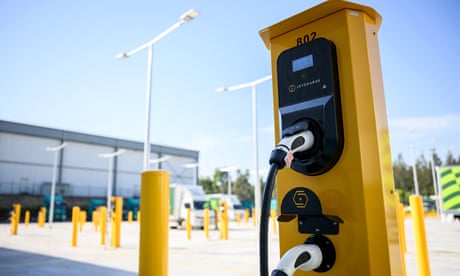Extract from The Guardian
Advertising expenditure on the large, highly polluting vehicles leapt by 29% between 2022 and 2023
Wed 15 May 2024 01.00 AEST
Last modified on Wed 15 May 2024 01.01 AESTCarmakers continue to aggressively market SUVs and 4x4s to Australians even as the government rolls out new fuel efficiency standards.
Advertising expenditure on the large, highly polluting vehicles leapt by 29% between 2022 and 2023 – and 59% since 2010 – undermining the environmental benefits of rising electric car use and countering new vehicle efficiency standards, according to climate advocacy group Comms Declare.
Its analysis of digital, television, outdoor, radio, cinema and print advertising data showed that spending on advertisements for SUVs rose to $125m in 2023. Online advertising dominated and brand sponsorship alone increased by 412% since 2010.
The advertising figures coincided with an 188% increase in SUV sales, with the vehicles now accounting for well over half of the market.
And, despite the $52m spent on advertising electric and hybrid vehicles in 2023 – and a 60% increase in their sales – overall advertising expenditure on low emissions vehicles more than halved since 2010, largely due to a collapse in the advertising of small cars, the data showed. Sales of hatchbacks and sedans remained steady.
The authors noted that Australia is unique in that its roads are so heavily dominated by “gas guzzling” SUVs and 4x4s. A report by the same group last year found that 55% of all new passenger vehicles sold in Australia in 2021 had an emissions intensity of more than 160 g/km of CO2 emitted, compared with just 10% in Europe.
Passenger cars and light commercial vehicles are responsible for 60% of Australia’s transport emissions and more than 10% of Australia’s total emissions.
“Vehicle importers spent $651m on ads in 2023 and those ads rarely, if ever, carry information about emissions or running costs”, stated the report, which calls for advertising restrictions and fuel efficiency information to be included in adverts.
The founder of Comms Declare, Belinda Noble, said the trend of increased advertising for larger vehicles was expected to continue even as fuel efficiency standards are brought in.
The Albanese government’s proposed new fuel emissions standards bill will see car companies reducing the average emissions of new cars and incentivise companies to sell cleaner models in greater numbers and varieties from 2025. It also aims to reduce “greenwashing” in advertising.
“A cynic would say makers of the most polluting cars are trying to off-load their cars before the [standards] come in,” she said.
“It’s something that the government should be mindful of, that while the fuel emissions provisions are a fantastic step forward, car importers will still try to push the most profitable, big polluting cars.
“That’s a headwind that we are going to have to tackle if we really want to reduce our transport emissions.”
She said the bill should force carmakers to declare the fuel efficiency of vehicles in advertisements, as is policy in France and Denmark.
Alongside their environmental impacts, SUVs have been criticised for their dangers to other road users.
The president of the Australian Electric Vehicle Association, Dr Chris Jones, said the upfront disclosure of a car’s emissions was “absolutely essential”.
“Just like cigarette advertising, people should be aware that they’re buying a potentially dangerous product,” he said.
Toyota Australia president and chief executive officer, Matthew Callachor, said the Japanese brand, which makes some of Australia’s most popular 4x4s, had “long supported the introduction of an ambitious fuel-efficiency standard that is calibrated to the unique requirements of the Australian market and leaves no-one behind.
“Our task now is to get on with the job of delivering diverse technologies that will enable our customers to choose vehicles with lower or zero carbon emissions that best suit their circumstances,” he said in a statement.

No comments:
Post a Comment